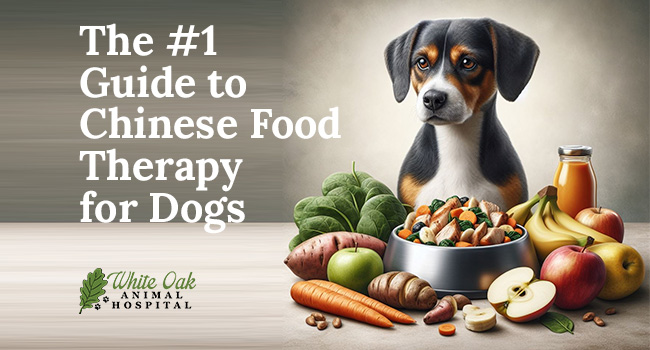Chinese food therapy for dogs is a holistic approach to canine nutrition that aims to promote health and well-being by strategically using specific foods and ingredients. Unlike conventional canine nutrition practices, which primarily focus on meeting the basic nutritional requirements of dogs, Chinese food therapy considers the energetic properties of foods and their effects on the body.
This ancient practice is rooted in the principles of traditional Chinese medicine, which views the body as a dynamic system that requires balance and harmony to function optimally. By incorporating Chinese food therapy into their pets’ diets, pet owners can potentially address various health issues and support overall wellness in their furry companions.
The key differentiator of Chinese food therapy for dogs is its emphasis on restoring balance and harmony within the body rather than simply providing essential nutrients. While conventional nutrition practices prioritize factors like protein, fat, and carbohydrate content, Chinese food therapy for dogs focuses on the energetic qualities of foods, such as their temperature, taste, and affinity for specific organs.
This approach allows for a more holistic approach to addressing specific health concerns in dogs, making it a valuable alternative or complement to conventional veterinary care. As pet owners seek alternative methods to support their pets’ health, Chinese food therapy for dogs emerges as a promising avenue for promoting well-being and vitality.
Foundational Principles of Chinese Food Therapy for Dogs

Yin represents darkness, coldness, and passivity in Chinese philosophy, while Yang embodies brightness, warmth, and activity. An imbalance between Yin and Yang can manifest as illness or disease when applied to dog health. Chinese food therapy for dogs seeks to address these imbalances by incorporating foods with specific energetic properties that can nourish Yin or invigorate Yang, depending on the individual dog’s needs.
By understanding the dynamic interplay between Yin and Yang, pet owners can tailor their dogs’ diets to promote overall balance and well-being. This approach not only supports the body’s natural healing processes but also helps prevent future health issues from arising. Through the strategic use of food as medicine, Chinese food therapy for dogs offers a holistic solution to promoting optimal health.
Classification of Foods in Chinese Food Therapy
In Chinese food therapy for dogs, foods are classified based on their energetic properties, crucial in influencing a dog’s body and health. These properties encompass various factors such as taste, temperature, and affinity for specific organs, all of which contribute to the overall balance within the body.

The impact of these properties extends beyond mere nutrition, as they are thought to influence the flow of energy, or Qi, throughout the body. By selecting foods that align with the dog’s individual constitution and health needs, pet owners can effectively support their pet’s overall well-being and vitality.
Incorporating this understanding of energetic properties into a dog’s diet can provide holistic support for their health, addressing physical ailments and promoting balance and harmony within the body. As pet owners strive to provide the best care for their furry companions, Chinese food therapy offers a natural and personalized approach to supporting their health and longevity.
Common Foods in Chinese Food Therapy

One such example is chicken, often recommended for its nourishing properties and ability to strengthen the body’s Qi, or vital energy. Chicken is believed to be beneficial for dogs experiencing weakness or fatigue and those recovering from illness or injury.
Another commonly used food in Chinese food therapy for dogs is sweet potato. Rich in vitamins, minerals, and fiber, sweet potatoes are considered excellent for supporting digestive health and regulating the body’s energy levels. They are often recommended for dogs with digestive issues or those needing a gentle source of carbohydrates.
Additionally, carrots and spinach are frequently incorporated into canine diets for their antioxidant-rich properties and ability to support eye health, immune function, and overall vitality. These vegetables are easy to digest and can be served cooked or raw, providing dogs with essential nutrients to thrive.
Moreover, certain fruits like apples and bananas are also included in Chinese food therapy for dogs due to their balancing effects on the body and ability to promote digestion and nutrient absorption. These fruits are often used as healthy treats or added to meals for a nutritional boost.
By incorporating these common foods into their dogs’ diets, pet owners can provide natural and wholesome nutrition while supporting their pets’ health and well-being. As part of a balanced diet, these foods can contribute to improved vitality, enhanced immune function, and overall longevity in dogs.
Dietary Recommendations and Guidelines
Implementing Chinese food therapy for dogs into their diet can be a beneficial way to support their overall health and well-being. Pet owners can start by incorporating foods with specific energetic properties that align with their dog’s needs.
For example, if a dog is experiencing heat-related issues, incorporating cooling foods like cucumber or watermelon can help alleviate symptoms. It’s also essential to balance Yin and Yang energies in the diet, ensuring a harmonious blend of nourishment. Gradually introducing new foods and monitoring their effects on the dog’s health is recommended.
Consulting with a veterinarian trained in Chinese food therapy can provide personalized guidance and recommendations tailored to the dog’s specific health concerns and dietary requirements. Following these practical guidelines, pet owners can effectively integrate Chinese food therapy into their dog’s diet to promote optimal health and vitality.

Our team is dedicated to providing personalized care tailored to your pet’s needs, with options such as TCVM Telemedicine consultations available to pet owners. We encourage you to explore the benefits of Chinese food therapy and other integrative options available at White Oak Animal Hospital to promote optimal health and longevity for your furry companion. Your pet’s well-being is our priority, and we are here to support you every step of the way.
Frequently Asked Questions
What health issues can Chinese dog food therapy help with, and how?
Chinese food therapy can address various dog health conditions, including skin problems, autoimmune diseases, and digestive issues. It utilizes foods with specific energetic properties to rebalance the body and support healing.
Are there any risks or considerations when using Chinese food therapy for dogs?
While Chinese food therapy is generally safe, pet owners should consult a veterinarian or animal nutritionist before making significant dietary changes. It’s essential to consider factors such as the dog’s health needs, existing medical conditions, and potential food allergies or sensitivities.
How does Chinese food therapy complement other holistic approaches to canine health?
Chinese food therapy for dogs integrates seamlessly with other holistic modalities, such as acupuncture and herbal medicine. Together, these approaches work synergistically to promote overall health and well-being in dogs by addressing underlying imbalances and supporting the body’s natural healing processes.
Related Posts
-
Why Try Food Therapy For Dogs?
Have you heard of food therapy for dogs? PET | TAO, a premium holistic pet…
-
Canine Wellness: Exploring Eastern Food Therapy for Dogs and 3 Alluring Reasons to Embrace It
Eastern food therapy for dogs is a hopeful option to ensure the well-being of our…
-
Discover Health Solutions For Your Pet with a Food Therapy Consultation
A food therapy consultation for your pet may be the key to uncovering their optimal…
-
Food Therapy for Cats
Could your feline benefit from food therapy for cats? Yes! In fact, you can help…









